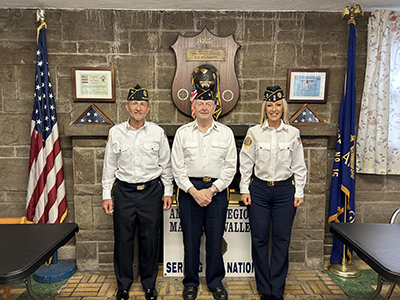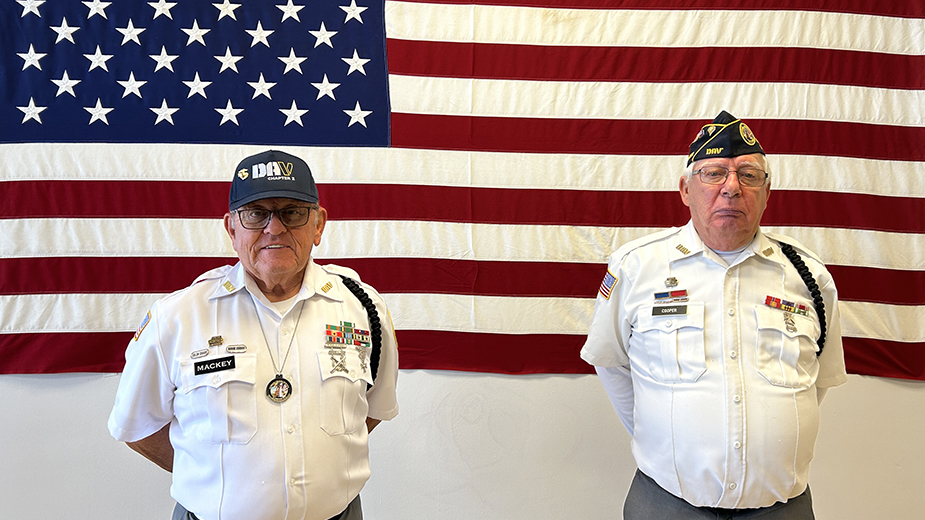YOUNGSTOWN, Ohio – For Bob Cooper and Terry Mackey, the Disabled American Veterans of Mahoning County means camaraderie, people who can relate to their experiences and helping other veterans.
When Cooper, DAV Chapter 2 finance officer, adjutant and fundraising chairman, returned from Vietnam, protesters threw dog feces in his face.
“I made up my mind, I’m not going to ever let a veteran get treated like I was,” he says.
For Rod Hosler, Greg Patrick and Holly Niotti-Soltesz, commander, first vice commander and chaplain, respectively, of American Legion Post 15 in Poland, membership means home and people who understand.
While both organizations cite full membership rosters, fewer vets are active in the groups. Hosler estimates his post has 20-25 active members. For the DAV, it’s about 20.
And membership in veterans’ organizations is down across the country.
An April 2022 article on Military.com reports that in the previous year, Veterans of Foreign Wars membership had declined to 1 million, down from more than 2 million in 1992. The article reports about 1 million American Legion members in 2021. The organization saw its peak membership in 1946 with 3.3 million, according to the article.
Mahoning Valley veterans groups are losing members too.
“Every year more and more posts aren’t able to keep running” because of shrinking membership, says Cari Delgado, Trumbull County Veterans Service Commission director.
Veterans who want to remain active must travel to the next closest post. Younger people aren’t joining the organizations in large numbers, Delgado notes. Jobs, children at home and children’s after-school activities pose hurdles for younger people. There’s also a generation gap, she says.
When Delgado first joined the American Legion, she was 30 with two kids and a third on the way. And she was the youngest person there.
“We have veterans’ organizations that are going to end up going defunct,” she says. That’s a loss to communities where those groups sponsor Little League teams, give away backpacks to children, conduct graveside services and 21-gun salutes, host parades and holiday events and help other veterans in need.
Camaraderie
The decline in membership is also a loss to veterans. They’ll miss the relationships they build with one another through such organizations and the camaraderie, Delgado laments.
“It’s difficult to relate to someone who’s been in the military if you haven’t,” she explains.
That’s true for both Mackey and Cooper of the DAV based in Austintown.
Both men joined after retiring and they rely on each other not only for DAV events such as fundraising, pinning fellow veterans in nursing homes and conducting honor guard and other services at funerals but to provide an understanding ear.
“I know if I call him at 2 o’clock in the morning, he’ll pick up,” Cooper explains.
Cooper, a U.S. Army veteran, was injured three times while in Vietnam. He was shot twice and stabbed by a North Vietnamese soldier’s bayonet the second time.
During fierce fighting at Tan Son Nhut Air Base where enemy forces outnumbered U.S. soldiers, Cooper’s buddy was injured, his arm hanging from his body.
Cooper took his shirt off to wrap around his friend’s arm to try to staunch the bleeding.
“That’s how I got bayoneted because I wasn’t watching,” he says.
Cooper turned and shot the North Vietnamese soldier then used the man’s body to cover himself and his friend and they stayed in a ditch for eight hours. That buddy survived, but another didn’t, and they laid next to his body all night waiting for reinforcements.
“I laid there for eight hours, smelling that,” he recalls. “I still smell it.”
Cooper was awarded the Bronze Star for saving his friend’s life.
But he suffers from post-traumatic stress with nightmares. His wife, his third, sleeps in a different room because Cooper may thrash about in his sleep.
He used to drink to dull the memory and numb the pain. Now he calls Mackey when he needs to talk. He only drinks a beer each year on his birthday and on Father’s Day.
Mackey, a retired Marine, relies on Cooper too. He was in Desert Storm, performing water purification as shells exploded all around him. He has PTSD and is an esophageal cancer survivor. Mackey used to drink too. Now he calls and talks to Cooper instead. But without the DAV, the two men may not have met.
Both understand the job and family obligations of younger veterans. They say they can handle the services and events that happen during the day. They need younger members though to help with lifting and more physical tasks.
The DAV provides wheelchairs and scooters for people in need, which sometimes requires lifting heavy equipment.
They approach other veterans when they see them at events, asking them to join, but haven’t realized much success.
Hosler of American Legion Post 15 says most of its members range in age from 65 to 80, but they have a smattering of individuals in their 20s and 30s.
Recruitment Efforts
Niotti-Soltesz, Post 15 chaplain, fills the recruitment role for her post. She joined about eight years ago and was its first woman.

“When I got out of the military, there was always something missing,” the U.S. Navy veteran recalls. “I missed the brotherhood, the sisterhood, the military construct, the camaraderie. I missed the relationships. And when I got involved, I found it all over again.”
Initially, she was hesitant about joining a veterans group, believing it was filled with old men. While she was the only woman when she joined, she fit right in.
“And even though we’re all different ages or different branches of the service, we have a family, and it’s like a blood bond,” Niotti-Soltesz offers. “It’s really unexplainable, because we didn’t serve together.”
Veterans feel at home together, she adds.
Patrick, a U.S. Coast Guard vet, likens it to people who attend the same high school or college.
“You went to the same place,” he says. “Even though it might have been different years, you still relate to everything on the walls.”
When Niotti-Soltesz sees someone in a military hat at an event, she approaches them, talks to them about the Legion and invites them to join. People like to be wanted, she reasons. And it’s borne fruit with more people joining, something she and her fellow officers attribute to her warm personality. The club has four active women members.
Other members then follow up to remind the prospective recruits of meeting days and times.
Hosler says the post’s Sons of the American Legion chapter also helps recruit members.
“When a person leaves the military, regardless of how long they’ve been in, they’ve lived a life of structure and purpose,” Hosler explains.
Aside from having a family, military service is the most important thing they’ve done in their lives, he says. “When they leave, there’s a void there.”
That may be a contributing factor to high suicide rates among veterans. They miss the family, says Hosler, a U.S. Army veteran.
Delgado, the Trumbull County Veterans Service Commission director, says veterans’ groups also provide opportunities for members to learn about services available.
“When you get out of the military, they don’t give you a handbook,” she says. “It’s ‘Here’s your DD214 [form]’ and that’s it. Unless you become involved, you’re not going to get updates of everything that’s available to you.”
Pictured at top: Mahoning County Disabled American Veterans Chapter 2 Commander Terry Mackey and Bob Cooper, finance officer, adjutant and fundraising chairman, stand in front of the American flag that hangs in the chapter’s Austintown office.
